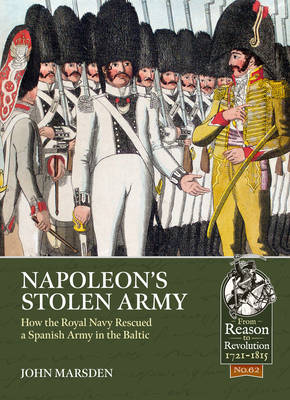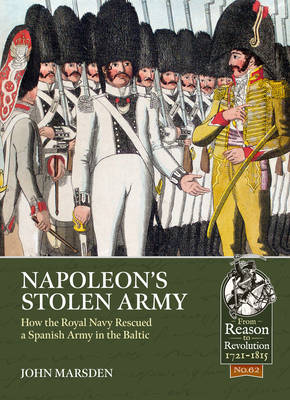
En raison d'une grêve chez bpost, votre commande pourrait être retardée. Vous avez besoin d’un livre rapidement ? Nos magasins vous accueillent à bras ouverts !
- Retrait gratuit dans votre magasin Club
- 7.000.000 titres dans notre catalogue
- Payer en toute sécurité
- Toujours un magasin près de chez vous
En raison de la grêve chez bpost, votre commande pourrait être retardée. Vous avez besoin d’un livre rapidement ? Nos magasins vous accueillent à bras ouverts !
- Retrait gratuit dans votre magasin Club
- 7.000.0000 titres dans notre catalogue
- Payer en toute sécurité
- Toujours un magasin près de chez vous
34,95 €
+ 69 points
Description
This is the story of a Spanish army, commanded by the Marqués de La Romana, which was sent to Denmark by Napoleon in 1807, while France and Spain were allies bound by the Treaty of San Ildefonso, signed in 1796. When relations between the two countries broke down in May 1808 they were soon at war with each other, and La Romana´s host became, in effect, a captive army in the hands of the French. When Spain looked to forge an alliance with Britain against her erstwhile ally, they found the British government only too eager to help. The Royal Navy's dominant presence in the Baltic provided a ready opportunity to seal the new alliance and, once the political groundwork had been laid, plans for a daring rescue of the entrapped Spaniards by Vice Admiral Keats' squadron were drawn up. However, while efforts were being made by the British to accumulate and prepare a sufficient amount of shipping to carry out the operation, difficulties soon arose in making contact with La Romana in order to convey to him the intentions of the Spanish and British high commands. This almost led to disaster, and the whole operation was saved only by some remarkable strokes of fortune, and the magnificent leadership provided by Keats and La Romana.
Until now this remarkable and little-known story has had little coverage in the various histories written about the Peninsular War, and what has been said about it in the Anglosphere has been confined to a description of events taken almost solely from a British perspective. Now, with access to a comprehensive collection of documents in the Spanish archives, it is possible to tell the story of the Spanish contribution to the successful operation in the Baltic, when the greater part of La Romana's army was evacuated from Danish Baltic territory during the summer of 1808.
Due to circumstance and bad fortune, a significant part of the Spanish army was left behind during the Royal Navy's action, and there is an interesting story told about what became of these men, related via the personal accounts left by two of the soldiers who did not return to Spain with La Romana.
Until now this remarkable and little-known story has had little coverage in the various histories written about the Peninsular War, and what has been said about it in the Anglosphere has been confined to a description of events taken almost solely from a British perspective. Now, with access to a comprehensive collection of documents in the Spanish archives, it is possible to tell the story of the Spanish contribution to the successful operation in the Baltic, when the greater part of La Romana's army was evacuated from Danish Baltic territory during the summer of 1808.
Due to circumstance and bad fortune, a significant part of the Spanish army was left behind during the Royal Navy's action, and there is an interesting story told about what became of these men, related via the personal accounts left by two of the soldiers who did not return to Spain with La Romana.
Spécifications
Parties prenantes
- Auteur(s) :
- Editeur:
Contenu
- Nombre de pages :
- 200
- Langue:
- Anglais
- Collection :
Caractéristiques
- EAN:
- 9781913118983
- Date de parution :
- 22-04-21
- Format:
- Livre broché
- Format numérique:
- Trade paperback (VS)
- Dimensions :
- 180 mm x 249 mm
- Poids :
- 453 g

Les avis
Nous publions uniquement les avis qui respectent les conditions requises. Consultez nos conditions pour les avis.






